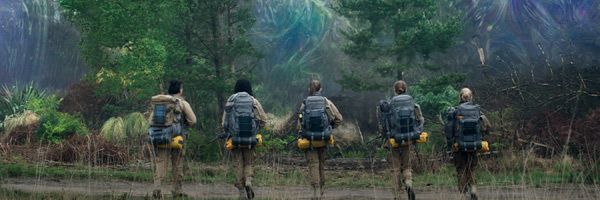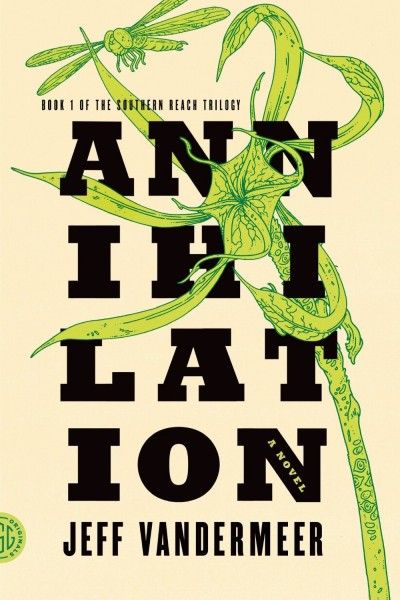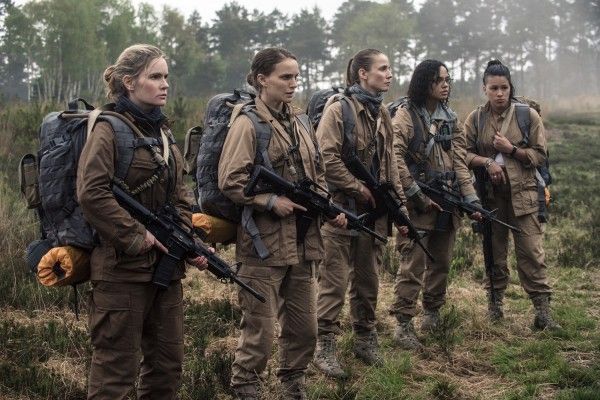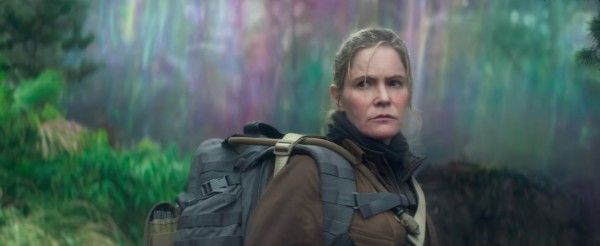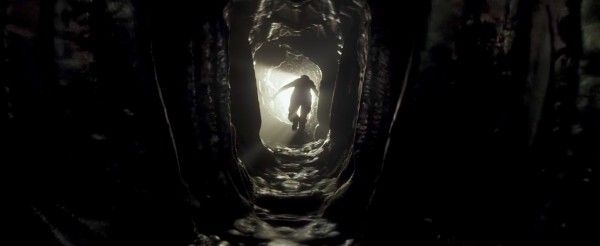There’s more than one way to adapt a novel for the big screen, and all have potential. A straightforward adaptation is an option, but so is a looser approach where the filmmaker holds onto a select few elements and crafts his or her own narrative using that framework. Right after walking out of Alex Garland’s Annihilation, I confidently labeled it the latter. But Garland’s film isn’t something you can quickly shake off and so, after quite a bit of thinking in circles, obsessing and trying to rationalize and explain a third act that has sparked many wildly different interpretations, I’ve come to view Annihilation the movie as one of my favorite forms of adaptation - one that functions as a companion piece to the book, where one enhances the other.
Haven’t seen Garland’s Annihilation or read Jeff VanderMeer’s book? Now might be the time to check out because this piece will include spoilers from both. It’s also worth pointing out that I’m writing from the perspective of someone who’s read Annihilation, not the entire Southern Reach trilogy, something I chose to do to preserve some of the mystery and keep my focus on the material Garland was working with.
Honestly? I didn’t love VanderMeer’s book. Yes, I know it’s an award-winning piece that’s widely lauded as a chilling, atmospheric and highly immersive exploration of a fascinating environmental anomaly but, simply put, it never clicked for me. VanderMeer delivers an abundance of stunning imagery and creates a deeply fascinating landscape that I really did want to learn more about, but just not as his narrator, the biologist, tells it. No, not every character has to be likable but accessibility is important and while the journal does offer a wide window into the biologist’s mind, she still comes across as a very closed off character.
And as presented in the source material, none of the supporting characters satiate the ache to connect to another human being in this otherworldly scenario. The psychologist is manipulative, the anthropologist is naive and the surveyor becomes an adversary. None inspire you to engage or root for them and the fact that their personal information is largely left out of the biologist’s account doesn’t do these characters any favors either. This all makes a ton of sense given the story is told from the biologist’s perspective and all of the scientists involved are required to withhold names and other personal information during this mission, but it did make it a challenge for me to feel invested, especially in the first half of the book.
As the biologist’s narrative continues and we learn more about the terrain she’s in and her life outside of Area X, I started to feel more of what some fans of the book have described - being enveloped and swept away by the unfolding mystery, what it means in the moment, for the future, and how it sheds light on present behavior. Ultimately, I wound up satisfied where this portion of the story ends and interested in moving on to the second novel in the series, but I have to admit, I was a little disappointed I wasn’t as swept away by the material as other readers.
Garland’s movie however, has a highly engaging quality to it right from the start. The biologist in the book loves her husband, but she isn’t a social butterfly by any means and her behavior often conveys less interest in her marriage. On the other hand, the movie’s first act is radiating with warmth and passion. Lena and Kane’s relationship isn’t all sunshine and rainbows, but it does offer a fast track to feeling invested in their situation before Lena ventures through The Shimmer and into Area X. And that quality continues to develop in interesting, powerful ways as the story progresses.
Lena loves Kane and is determined to figure out how she can help him, but the story isn’t as simple as Lena achieving her goal and saving her husband. It’s complicated by a possible affair (depending on how you feel about her moving on at that point), and it’s also complicated further by Garland’s script structure. We see where Lena winds up right at the beginning of the movie, and that conversation between Lena and Lomax is revisited throughout. Your mind is essentially in overdrive trying to assess how Area X is changing Lena in the present, how her marriage with Kane and his disappearance affected her, and then also what kind of person she is after she crosses back over the border. It’s essentially another form of the refraction happening in Area X that Tessa Thompson’s character describes. In Area X, genes are constantly being refracted so everything is affected by and to an extent becomes what’s around them. And this isn’t just happening to the people or animals living in this terrain, but the terrain itself is absorbing qualities of its inhabitants as well. It’s an extreme and supernatural version of the notion that we are a product of our experiences.
Further amplifying that idea is the new batch of supporting characters. There are some similarities between this group and the supporting characters in the book - Jennifer Jason Leigh’s Dr. Ventress is the leader and psychologist, some of the characters have military backgrounds, etc. - but in Garland’s interpretation of the source material, he gives these characters backstory and feelings that are much quicker and easier to decipher - but not to the point of being too transparent. The characters in the book do wind up making very strong decisions near the end, but what I got from Garland’s movie that I didn’t get from VanderMeer’s book was instant engagement with these characters.
And better yet, Gina Rodriguez’s Anya and Thompson’s Josie in particular aren’t just throwaway characters that are meant to be likable from the start merely to get a rise out of the viewer as they’re picked off. It’s vital to the story that everyone has a different, highly personal reaction to Area X. Anya is overconfident and rattled by the lack of control in the terrain while Josie finds comfort in the landscape. I’ve always been aware of the fact that everyone is a product of their surroundings, experiences and aspirations, but Annihilation gives you a concentrated dose of that idea. It’s a shock to the system that enhances the movie and will keep the narrative on your mind well after.
It’s that exact thing that inspired me to re-read VanderMeer’s book. No, it’s not a favorite now, but I was able to appreciate the progress of the mission in the book a lot more. It was almost as if I was using Annihilation the movie as another journal while re-reading the book. The stories don’t take place in the same world so it can’t correlate in that sense, but it is well worth taking into account the differences in human behavior when presented with the unknown, especially an unknown that can change the world.
Do you need to see the movie before reading the book or vice versa? Absolutely not, but we’re all individuals with our own unique qualities, tastes and histories, so if you can enhance your experience with a certain story out there by exposing yourself to additional information, all the power to you! I, for one, am glad I took a cue from the Annihilation blueprint, refracting the two interpretations of the story because, in my experience, one version enhanced the other.

